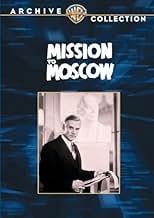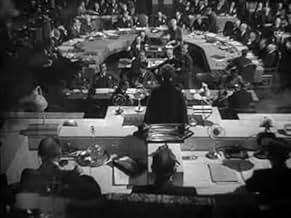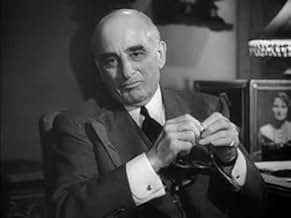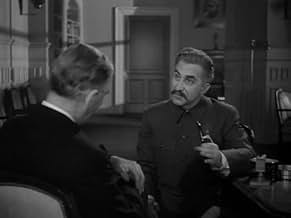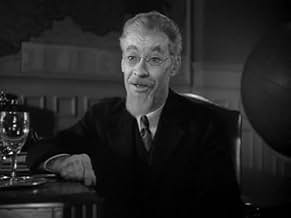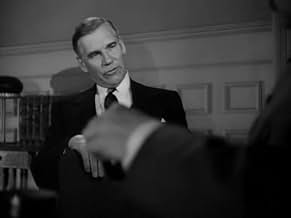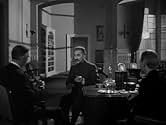CALIFICACIÓN DE IMDb
5.4/10
1.1 k
TU CALIFICACIÓN
Agrega una trama en tu idiomaAmbassador Joseph Davies is sent by FDR to Russia to learn about the Soviet system and returns to America as an advocate of Stalinism.Ambassador Joseph Davies is sent by FDR to Russia to learn about the Soviet system and returns to America as an advocate of Stalinism.Ambassador Joseph Davies is sent by FDR to Russia to learn about the Soviet system and returns to America as an advocate of Stalinism.
- Dirección
- Guionistas
- Elenco
- Nominado a 1 premio Óscar
- 2 premios ganados y 1 nominación en total
- Dirección
- Guionistas
- Todo el elenco y el equipo
- Producción, taquilla y más en IMDbPro
Opiniones destacadas
Self-professed "capitalist" and businessman Joseph Davies is sent to Moscow by President FDR just prior to the outbreak of hostilities in Europe in 1939. His mission; assess the war-readiness of the Soviet people and the reliability of the Stalin regime as a potential ally.
What follows could be described as a "guided tour" of Soviet Russia, courtesy of the Kremlin. Davies embarks on a whirlwind inspection of Soviet farms, factories, schools and cities, all abuzz with the task of transforming a semi-feudal nation of serfs and peasants into a mighty world power. It is - as its critics claim - a heavy-handed glorification of the Soviet "workers" state under Stalin. At the same time, it is an early confirmation of what most recent historians have acknowledged; the Stalin regime, for all its flaws, was a popular regime with the Russian people with astounding achievements to its credit. Viewers, at any rate, can make up their own minds (a useful recent survey is *Stalinism as a Way of Life* - Yale U Press, 2000).
Walter Huston is effective as the droll, efficient Davies. Watch, too, for a plethora of uncredited "B" actors on screen for just a few seconds. Glenn Strange, Tom Tully and Kathleen Lockhart are familiar faces to fans of the thirties and forties and serve to jar us back to reality at critical points. The film is a useful antidote to the overwhelming and omnipotent anti-Sovietism of the Cold War, and should be taken as such.
What follows could be described as a "guided tour" of Soviet Russia, courtesy of the Kremlin. Davies embarks on a whirlwind inspection of Soviet farms, factories, schools and cities, all abuzz with the task of transforming a semi-feudal nation of serfs and peasants into a mighty world power. It is - as its critics claim - a heavy-handed glorification of the Soviet "workers" state under Stalin. At the same time, it is an early confirmation of what most recent historians have acknowledged; the Stalin regime, for all its flaws, was a popular regime with the Russian people with astounding achievements to its credit. Viewers, at any rate, can make up their own minds (a useful recent survey is *Stalinism as a Way of Life* - Yale U Press, 2000).
Walter Huston is effective as the droll, efficient Davies. Watch, too, for a plethora of uncredited "B" actors on screen for just a few seconds. Glenn Strange, Tom Tully and Kathleen Lockhart are familiar faces to fans of the thirties and forties and serve to jar us back to reality at critical points. The film is a useful antidote to the overwhelming and omnipotent anti-Sovietism of the Cold War, and should be taken as such.
Among the comments here I don't see much recognition of the fact that this propaganda film was released at the height of World War II, when the battle against Nazis was focused on Stalingrad, which arguably was the crucial battle of the war in Europe.
The context of this film cannot be ignored or minimized. Propaganda films are morale films, and the omissions and distortions which have been cited in Mission to Moscow are beside the point. Of course Stalin was a monster before, during and after World War II. Of course Joseph E. Davies was a naif, and a pompous one at that. Perhaps that's why he only lasted a year as ambassador.
On one hand, there is an absolutely ludicrous review here, praising Mission to Moscow as dispelling the terrible calumnies against the great Soviet achievements. On the other hand, there are those on the opposite side who, though far more accurate about Stalin and about how this film whitewashes his atrocities, seem so rabid in their responses, they fail to understand, or conveniently ignore, that propaganda films as documentaries are more or less bull, and that it's stupid to criticize a propaganda film because it's a propaganda film.
What is interesting about Mission to Moscow is not what it is trying to say or do, which requires little insight to divine, but how well it does it. This is a Hollywood "A" film enlisted in the service of propaganda. Top cast, direction and production values should have made for a very strong message to 1943 American audiences, whom the government wanted to think of the war against Germany as "We're all in this together."
As to the outrage of Stalin's show trials, I think that the sinister, menacing demeanor of one of the great Hollywood heavies Victor Francen as prosecutor Vyshinsky, versus the rather meek, contemplative demeanor of the defendants, suggests that the film knows what's going on, even if Davies doesn't.
Yes, the relentless pro-Soviet propaganda is a bit hard to take for those who sit smugly in the light of hindsight. But if you look at Mission to Moscow as document rather than documentary, you will gain an insight into the kind of public mindset called for by our government at a crucial moment in our history.
The context of this film cannot be ignored or minimized. Propaganda films are morale films, and the omissions and distortions which have been cited in Mission to Moscow are beside the point. Of course Stalin was a monster before, during and after World War II. Of course Joseph E. Davies was a naif, and a pompous one at that. Perhaps that's why he only lasted a year as ambassador.
On one hand, there is an absolutely ludicrous review here, praising Mission to Moscow as dispelling the terrible calumnies against the great Soviet achievements. On the other hand, there are those on the opposite side who, though far more accurate about Stalin and about how this film whitewashes his atrocities, seem so rabid in their responses, they fail to understand, or conveniently ignore, that propaganda films as documentaries are more or less bull, and that it's stupid to criticize a propaganda film because it's a propaganda film.
What is interesting about Mission to Moscow is not what it is trying to say or do, which requires little insight to divine, but how well it does it. This is a Hollywood "A" film enlisted in the service of propaganda. Top cast, direction and production values should have made for a very strong message to 1943 American audiences, whom the government wanted to think of the war against Germany as "We're all in this together."
As to the outrage of Stalin's show trials, I think that the sinister, menacing demeanor of one of the great Hollywood heavies Victor Francen as prosecutor Vyshinsky, versus the rather meek, contemplative demeanor of the defendants, suggests that the film knows what's going on, even if Davies doesn't.
Yes, the relentless pro-Soviet propaganda is a bit hard to take for those who sit smugly in the light of hindsight. But if you look at Mission to Moscow as document rather than documentary, you will gain an insight into the kind of public mindset called for by our government at a crucial moment in our history.
It's 1943, and Hollywood decides that a good 'educational' drama is needed to reassure an American public that is somewhat conflicted on being allied with Soviet Russia for the Second World War. Thus we are treated to this picture, one of the most scurrilously evil films that has ever had wide release. Yes, I said evil. No, there's no gratuitous sex or violence or bad language in the film. Just a wholesale haigiography of history's most prolific mass murderer, and the mendacious celebration of a regime whose primary accomplishment was to torture and/or murder tens of millions of people. Other reviewers have compared it as a propaganda piece akin to "Triumph of the Will" or "Battleship Potemkin", but this shameful film has none of Riefenstahl's artistic direction or Eisenstein's imagery. Just one monstrous lie after another served up to justify aggression, war-mongering, totalitarianism, secret police tactics, repression and every other evil of the 20th century. In a just world the makers of this film, if they were not duped into believing it themselves, should have been consigned to the Gulag that they glorified with this hateful piece.
Businessman Joseph Davies is sent to Stalin's Russia by FDR shortly before war breaks out. His assignment: assess the Soviet's war-making capabilities, the extent of their war-readiness and Stalin's reliability as a potential ally against Hitler. What he sees contradicts a good deal of the anti-Soviet reporting in the (Henry Luce) national press and elsewhere. The Soviets have organized a society of largely peasants and serfs into a first-class industrial power. The Stalin regime enjoys widespread popular support, and the Kremlin seems to be preparing for war with the Nazis. On the other hand, as Stalin warns half-way through the film, anti-Soviet feeling in the British and French governments may necessitate a temporary Soviet "truce" with Hitler to gain more time to prepare for war.
The film (by the director of "Casablanca" is frequently plodding and arcane. However, for war-time audiences, it offered an sure-footed defense of the Russian war effort at a time when the full capabilities of the Soviet Red Army were being dramatically made known (the film was released shortly after the seminal German surrender at Stalingrad, the most frightful battle of modern warfare). Too, much of the film suggests what recent historians have confirmed; Stalin's regime, while widely loathed in the West, precipitated an astonishing degree of devotion and loyalty at home, a point driven home by the outcome of a thousand battles from the Volga to Berlin.
It seems that just about every bit player in Hollywood appeared at least once in this movie. Watch especially for Glenn Strange in a three second appearance as a southern newspaper reporter. The fillm was a major part of the war effort half-way through that conflict, and appears to have succeeded admirably in its original purpose. Walter Huston, as Davies, is absolutely first rate as the droll, understated American capitalist who nevertheless comes to appreciate the war effort of a much maligned people and social system.
The film (by the director of "Casablanca" is frequently plodding and arcane. However, for war-time audiences, it offered an sure-footed defense of the Russian war effort at a time when the full capabilities of the Soviet Red Army were being dramatically made known (the film was released shortly after the seminal German surrender at Stalingrad, the most frightful battle of modern warfare). Too, much of the film suggests what recent historians have confirmed; Stalin's regime, while widely loathed in the West, precipitated an astonishing degree of devotion and loyalty at home, a point driven home by the outcome of a thousand battles from the Volga to Berlin.
It seems that just about every bit player in Hollywood appeared at least once in this movie. Watch especially for Glenn Strange in a three second appearance as a southern newspaper reporter. The fillm was a major part of the war effort half-way through that conflict, and appears to have succeeded admirably in its original purpose. Walter Huston, as Davies, is absolutely first rate as the droll, understated American capitalist who nevertheless comes to appreciate the war effort of a much maligned people and social system.
An odd little movie. "Mission to Moscow" was brought to my attention by a BBC documentary on Stalin in the war years "WWI Behind Closed Doors". It describes the intense diplomatic efforts made by the allies during WWII to bring the Soviet Union into the war against Germany. Leaders in the West were willing to cast a blind eye to Soviet brutality and repression, including the massacre of Polish military officers at Katyn and the establishment of puppet governments in the territories they controlled, in order to keep them on the side of the West. This effort involved swaying public opinion in Western countries, and Joseph Davies' "Mission to Moscow" was cited as an example of this effort. There is an excellent article on Davies in Wikipedia, which describes how keen he was to see only the positive in the Soviet Union. Ironies abound in this film. Molotov appears as a kindly old professorial gent, Stalin is a hopeful visionary yearning for world peace. The glimpses of daily life in the Soviet Union include ice skating parties with piles of food, high fashion for the ladies, English-speaking railroad workers with nothing but love for their country, and American expatriates expressing admiration for the inventiveness of the Russian hosts they are there to help. In fact, while Davies was ambassador, a large number of American expats were being imprisoned by Stalin as counter-revolutionaries, despite having voluntarily emigrated to the Soviet Union to contribute to building a new society. Many petitioned the US Embassy to have their passports restored, and Davies refused to intervene. At one point, the US embassy staff in Moscow threatened to resign en masse. When Stalin consolidated power with the purges of his former associates in 1936 ~ 1938, Davies attended several of the show trials, and in "Mission to Moscow" he is shown nodding knowingly when Bukharin and the other defendants "confess" to their anti-Soviet activities and conspiratorial association with the now arch-enemy Trotsky. In the movie, Davies repeatedly insists that his mission is to see the **real** Soviet Union first-hand, yet in his visits were said to have been highly scripted and organized by the Soviet authorities. In retrospect, Davies comes off as a naïve fool, but seen in the larger context, perhaps someone a little more competent would not have been able to supplied the West with the kind of pro-Soviet view Davies could supply.
But let's put history aside for a moment. This is just a bad film. It is stilted, over-scripted, and whatever points it is trying to make are spoon-fed to the audience. Davies had control over the final script, and his scenes come off as highly self-serving: Davies warning of the dangers of war over the objections of more experienced statesmen, Davies being congratulated at every turn by one world leader after the next for his insight into the coming war in Europe. You know pretty much at the beginning of each scene what is going to unfold – a vacation with the family to get away from world affairs ends with a phone call from the White House, a meeting with senators expressing doubt about the strength of Germany will end with Davies convincing them with facts to the contrary. And Walter Huston is just overworked here – he has to carry virtually every scene, because really, Mission to Moscow is mostly about Davies himself.
A just plain awful movie and yet fascinating to watch, especially for a glimpse into this brief period of time when the US actually tried to like Stalin, and fascinating also for the fantasy views of Soviet life in the late 1930s. And particularly worthwhile if you also take the time to research the persons and events portrayed in the movie and juxtapose these against the events portrayed in Mission to Moscow. It is a very educational experience.
At the time I saw this movie, it was not available on DVD, but could be downloaded from the Warner Brothers movie archive.
But let's put history aside for a moment. This is just a bad film. It is stilted, over-scripted, and whatever points it is trying to make are spoon-fed to the audience. Davies had control over the final script, and his scenes come off as highly self-serving: Davies warning of the dangers of war over the objections of more experienced statesmen, Davies being congratulated at every turn by one world leader after the next for his insight into the coming war in Europe. You know pretty much at the beginning of each scene what is going to unfold – a vacation with the family to get away from world affairs ends with a phone call from the White House, a meeting with senators expressing doubt about the strength of Germany will end with Davies convincing them with facts to the contrary. And Walter Huston is just overworked here – he has to carry virtually every scene, because really, Mission to Moscow is mostly about Davies himself.
A just plain awful movie and yet fascinating to watch, especially for a glimpse into this brief period of time when the US actually tried to like Stalin, and fascinating also for the fantasy views of Soviet life in the late 1930s. And particularly worthwhile if you also take the time to research the persons and events portrayed in the movie and juxtapose these against the events portrayed in Mission to Moscow. It is a very educational experience.
At the time I saw this movie, it was not available on DVD, but could be downloaded from the Warner Brothers movie archive.
¿Sabías que…?
- TriviaThis film was often mentioned during the 1947 House Un-American Activities Committee (HUAC) in its investigation of alleged Communist infiltration of the motion picture industry and was chiefly responsible for the blacklisting of screenwriter Howard Koch. Warner Bros. studio head Jack L. Warner defended the picture as being "made when our country was fighting for its existence, with Russia as one of our allies . . . The picture was made only to help a desperate war effort and not for posterity."
- ErroresAside from the issue of the fairness of the Moscow purge trials, or the truthfulness of the alleged confessions of the accused, the people shown standing trial together in the film in fact did not all stand trial at the same time. There were two such major show trials, one in 1937, the second in 1938, and the real life characters depicted in the film as being tried simultaneously were actually tried in separate groups at one of the two trials.
- Citas
Ambassador Joseph E. Davies: Mr. Stalin, I believe history will record you as a great builder for the benefit of mankind.
- Créditos curiososOpens with a card reading: We have the honor to present the former Ambassador from the United States to the Soviet Union, the Honorable Joseph E. Davies, who will address you prior to the showing of the film made from his important book, "Mission to Moscow". In the picture itself, Mr. Walter Huston portrays Mr. Davies during those vital years encompassed in his now significant report to this nation. And now, Mr. Davies: [Mr. Davies gives a presentation on the actual events leading up to these events, and to this film.]
- ConexionesFeatured in Hollywood on Trial (1976)
- Bandas sonorasAmerica
(uncredited)
aka "My Country 'tis of Thee"
Music from "God Save the King"
Traditional
[In the score when Woodrow Wilson's bust is shown]
Selecciones populares
Inicia sesión para calificar y agrega a la lista de videos para obtener recomendaciones personalizadas
- How long is Mission to Moscow?Con tecnología de Alexa
Detalles
- Fecha de lanzamiento
- País de origen
- Idiomas
- También se conoce como
- Mission to Moscow
- Locaciones de filmación
- Lake Arrowhead, San Bernardino National Forest, California, Estados Unidos(Lake that Joe and family set off in a dingy named after his wife Marjorie)
- Productora
- Ver más créditos de la compañía en IMDbPro
Taquilla
- Presupuesto
- USD 1,516,000 (estimado)
- Tiempo de ejecución2 horas 4 minutos
- Color
- Relación de aspecto
- 1.37 : 1
Contribuir a esta página
Sugiere una edición o agrega el contenido que falta

Principales brechas de datos
By what name was Misión en Moscú (1943) officially released in India in English?
Responda
